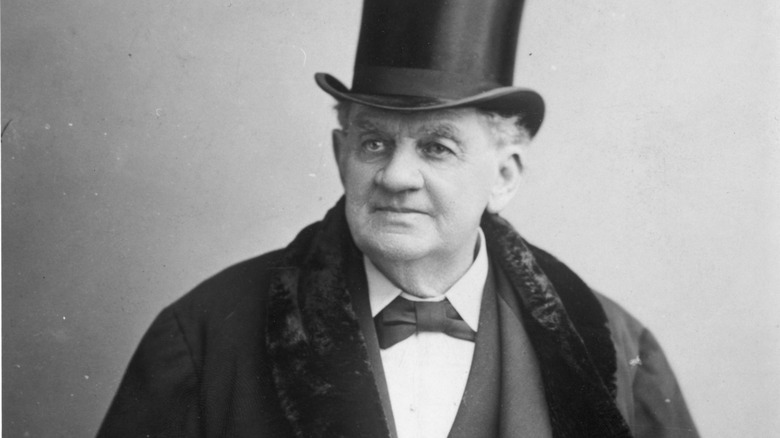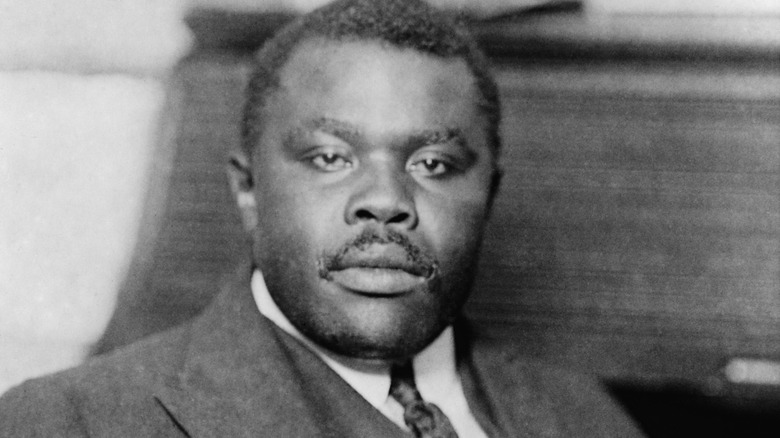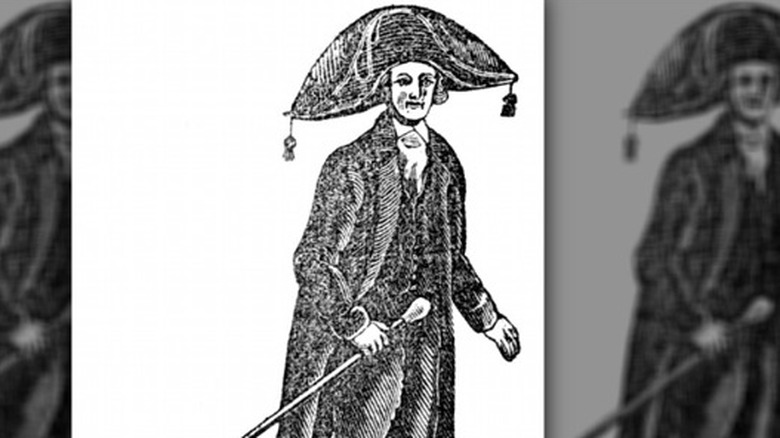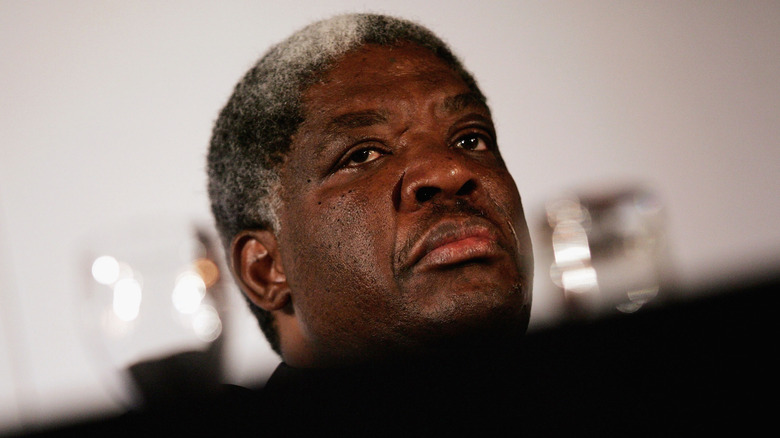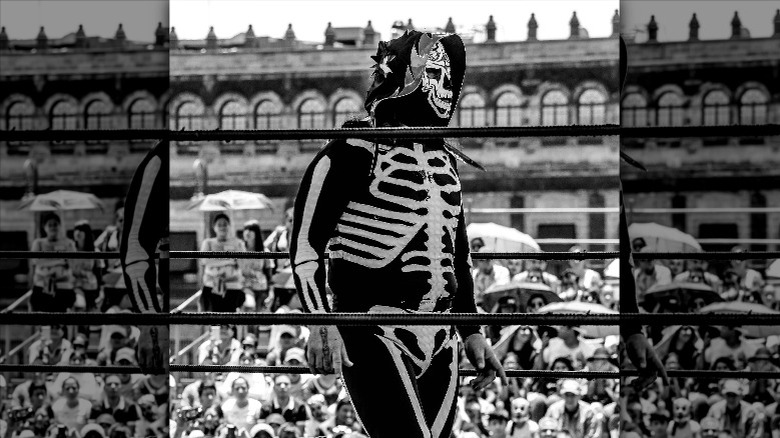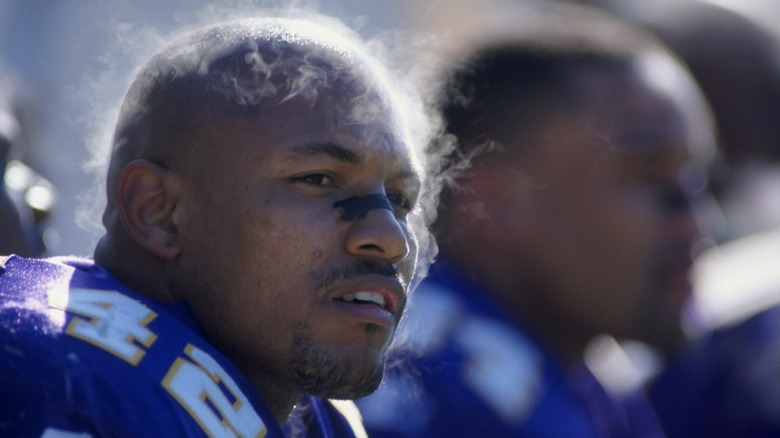Famous Deaths Predicted Before They Happened
There's an old thought experiment that asks people about the prospect of their own demise. If you could know the when, where, and how of your death, would you want to? Would it change the way you lived your life on a daily basis? Would you do more good things, in an attempt to make your life more meaningful before facing the great hereafter, or would you, say, pick up skydiving or spelunking, knowing that's not how the end was going to come?
Obviously, it's not that simple. Perhaps unsurprisingly, given our morbid fascination with death, there have been predictions — intentional and unintentional — made on how and when famous people were going to die. And ultimately? Some of the predictions were pretty spot on. Of course, there's a million wrong ones for all the right ones, and as another old saying goes, even a stopped clock is right twice a day. Still, it's pretty eerie to see any deaths predicted before they happen.
Sometimes, it was days: A not-so serious incident turned deadly, for instance. Other times, predictions have come years in advance. And sometimes, they're so specifically weird that, well, it just makes a person wonder.
P.T. Barnum
P.T. Barnum was a morally questionable showman who pushed the boundaries of entertainment with sideshow curiosities like Joice Heth. She, says Mount Vernon, was the enslaved person he purchased from a promoter who claimed to have gotten her from George Washington's father. Barnum exhibited her as Washington's nurse — claiming she was 161 years old — and when she died, he sold tickets to her dissection.
Heth died seven months after Barnum started exhibiting her, and as for Barnum himself, he lived another 65 years, give or take. According to his obituary in The New York Times, Barnum died a painless, sedative-assisted death on April 7, 1891. A retrospective published in the New York Times 100 years later took a look at the circumstances surrounding his death, including the fact that he had predicted it himself.
Barnum had been off-and-on sick for about five months, when he reached out to the New York Evening Sun. According to Robert Pelton, the curator of the Barnum Museum, he wanted to know how he was going to be remembered, so he asked them to publish an obituary-esque life story he could read before he passed. They did, and Pelton said he approved of the way in which he was memorialized. He was actually dead shortly afterward, and it's noteworthy that while his post-mortem obit mentioned the exhibition of Joice Heth as one of his greatest achievements, he requested that his own body be viewed only by close relatives, before being interred in a strictly private ceremony.
Marcus Garvey
Marcus Garvey was a Jamaican-born, London-educated civil rights activist who had the dubious honor of being among those targeted by J. Edgar Hoover for some good, old-fashioned spying. After serving some jail time, living in Switzerland to present his views on the necessity of a "separate but equal" organizational system for the world's races, and founding Jamaica's People's Political Party, History says he returned to London in 1935. He died five years later, at the young age of 52. Those closest to him had suggested that his death was ultimately caused because it was reported before it happened.
Face2Face Africa says that Garvey suffered a stroke in January 1940. He had been struggling with some health issues before that, but he was well enough to return home after his stroke. There, he was reportedly up, about, and in a decent way.
Until, that is, he opened a copy of the Chicago Defender — a highly regarded and respected publication founded by a Black attorney — to see the headline: "Marcus Garvey Dies in London." The article described him as dying "broke, alone, and unpopular," and those who knew him best — including his personal secretary — blamed the shock of seeing his own obituary printed as the cause of a second stroke and his death in June of 1940.
Biz Markie
On July 1, 2021, some sad news started making the rounds on social media in the form of an image captioned, "Biz Markie has passed away." It wasn't entirely unbelievable, either — according to USA Today, the rapper had been candid about his diagnosis of Type 2 diabetes, the health risks that came with it, and the struggles he faced after his 2011 diagnosis. In 2020, he was hospitalized for what was reported as "non-COVID complications suffered from a history of Type II diabetes," and suffered a stroke the same year. In 2014, he had revealed that his 140-pound weight loss came after doctors told him that he needed to lose the weight, or risk making his complications worse. He told ABC News, "I wanted to live."
When news of his passing started making the rounds on social media, his manager was quick to debunk them. Jenni Izumi released a statement saying: "The news of Biz Markie's passing is not true. Biz is still under medical care, surrounded by professionals who are working hard to provide the best healthcare possible."
Tragically, the social media report turned out to be just 16 days too early. On July 16, 2021, Rolling Stone reported that Izumi had issued a statement saying that Biz Markie had passed away. The cause — which wasn't immediately reported — was later revealed to be complications from diabetes (via Vanity Fair).
Kurt Cobain
On March 5, 1994, the Los Angeles Times reported that not only had Kurt Cobain canceled some scheduled concerts in Germany because of an undisclosed illness, but that he had been admitted to a hospital in Italy. It was revealed that he was in a drug-induced coma stemming from the use of alcohol, sedatives, and painkillers; Nirvana manager Janet Billig said the drugs were a prescription given for "influenza and a throat condition," while the Italian media reported that he had also taken a rarely-prescribed sedative.
At the time, other reports started circulating in the U.S. media that claimed he had died, despite his mother's clarification that he had strong vital signs and was expected to make a full recovery. Just what had happened remained unclear, with many — including Courtney Love — believing that he had taken the potentially deadly combination with the intent to commit suicide. According to Ultimate Classic Rock, Cobain's management company is among those who say otherwise, even as they admit that yes, he did leave what appeared to be a suicide note.
Just over a month later — on April 8, 1994 — Cobain's body was discovered in the room above his Seattle garage. Although his death at just 27 years old was widely reported as a result of suicide, Rolling Stone says that there have been continuing questions about whether or not it should have been ruled a homicide.
If you or anyone you know is having suicidal thoughts, please call the National Suicide Prevention Lifeline by dialing 988 or by calling 1-800-273-TALK (8255).
Joe DiMaggio
Some names just become synonymous with their career, and that's absolutely the case with Joe DiMaggio and baseball. According to PBS, a sign hung from the bed that he died in: It read "April 9, Yankee Stadium or Bust," and it was a reference to his most immediate goal of throwing the first ball of the 1999 season.
Tragically, he died on March 8, a little more than a month short of his goal — and he didn't get to set foot in Yankee Stadium again. (The last time had been in September of the year before, when he was given replacements for his stolen World Series rings.) His official cause of death was lung cancer, and his passing came just five months after his diagnosis. However, his death had already been announced about a month prior to his actual passing.
Sports Illustrated says that the massive mistake was made by NBC, who blamed an anonymous technician for mistakenly activating a bottom-of-the-screen crawling announcement that claimed DiMaggio had died. It followed 14 weeks of headlines that were growing increasingly more dismal as his condition worsened, and on January 24, they announced that the 84-year-old was dead. He absolutely was not — not yet.
Lord Timothy Dexter
Lord Timothy Dexter — who, says Priceonomics, wasn't actually a lord, but just insisted that's what everyone called him. He was born in 1747, and was one of the most notorious eccentrics of his era. He was also a millionaire, thanks to a series of investments that never should have worked, but somehow did. That included exporting coal by ship from Connecticut all the way across the Atlantic to Newcastle ... a city known for — wait for it — their coal production. By one of the many flukes that would define his life, they just happened to be in the middle of a strike and actually needed coal — so, he made a fortune.
Along the way, he got a ton of hate from the wealthy, upper class that he wanted to be included in. He knew it, too, and came to the conclusion that he wanted to know what was going to be said about him when he died. So, he built a tomb, commissioned a coffin, and hired a handful of people to organize a fake funeral on the heels of his announcement of his own death. About 3,000 people showed up, and the whole thing was blown wide open when he was discovered caning his wife for not being sufficiently sad (via the New England Historical Society).
Dexter (who was mostly illiterate) lived long enough to write a book (which included all punctuation at the end, for the do-it-yourself reader), and died — for real — not long after, in 1806.
Whitney Houston
Whitney Houston had a voice like no other, and her death shocked the world. According to CNN, her February 11, 2012 passing was ruled as accidental, and her drowning was attributed to the combination of a heart condition called atherosclerotic heart disease (which had caused around a 60% narrowing of her arteries), and chronic drug use. She was found to have a "moderate" level of cocaine in her system at the time of her death, along with Benadryl, marijuana, Xanax, and a muscle relaxant called Flexeril. While the official coroner's report didn't exactly connect the dots as to what had happened, eerily it wasn't the first time headlines had linked Houston's death with drug addiction.
In 2001, Houston's publicist, Nancy Seltzer, issued a public statement (via ABC News) condemning reports that Houston had died of a drug overdose. It was heartbreaking stuff, reading (in part): "She is perfectly fine and does not understand why, with everything that is going on in the world right now, they have to find new rumors to dig up." Seltzer went on to say that Houston and her family were being harassed with phone calls wanting to know the details of what had happened, when nothing had.
Rumors of her death were kick-started by her cancellation of a concert and previous arrests for drug- and alcohol-related issues. At the time Houston died 11 years later, she was preparing for a Grammy party after further news about her struggles with addiction.
If you or anyone you know is struggling with addiction issues, help is available. Visit the Substance Abuse and Mental Health Services Administration website or contact SAMHSA's National Helpline at 1-800-662-HELP (4357).
Levy Mwanawasa
Zambia's third president, Levy Mwanawasa (via Britannica), became the Movement for Multiparty Democracy's presidential candidate on the heels of accusing the nation's government of things like going along with irresponsible and greedy policies. He was sworn into office in 2002, and despite constant attempts at making some serious political reform, he didn't get far, thanks to constant opposition.
In 2008, France 24 reported that he had been hospitalized in France after suffering a stroke — and they followed that up with confirmations that no, despite widespread reports, he wasn't dead. However, the reports were so adamant that he had died that they were picked up by other governments, who continued to spread the story that he had passed away. They were condemned as a move to discredit him and his work, and in July of that same year, Bloomberg was also reporting that representatives of Zambia's government were confirming that he was absolutely alive, and the person who had supposedly written the death notice didn't actually exist.
They assured everyone that he was still in the hospital as he was being treated for hypertension, but on August 19 — two months after his stroke — The Guardian reported that he had passed away, while still in France. Citing health concerns that had pre-dated his election to the presidency, the news outlet revealed that his health had taken a turn for the worse, and although he was rushed into emergency surgery, he passed away.
La Parka II
Pro wrestling might be heavily scripted, but there's still plenty that can go wrong — and it went extremely wrong in October of 2019. That, says the LA Times, is when the pro wrestler Jesus Huerta Escoboza suffered a major accident that left him paralyzed. Escoboza — better known as La Parka II — dove through the ropes at his opponent. He misjudged and hit his head, first on the guard rail, then on the floor.
He was rushed off to undergo emergency surgery, and Wrestletalk says that's when the fake press release started circulating. Along with the very real news that he had sustained fractures in his neck and back, there was also the news that he had died. The Mexican wrestling federation, Lucha Libre AAA Worldwide, took to Twitter to confirm the news was fake, and that they were still hopeful he was going to make a full recovery.
That wasn't going to happen. On January 13, 2020, CNN reported that Escoboza's condition had worsened in the months since his accident, and after suffering from kidney and lung failure, he had passed away.
Orlando Thomas
Louisiana Athletics Hall of Fame defensive back Orlando Thomas more than earned his spot among the Ragin' Cajuns' elite, with a slew of collegiate awards, a career with the Minnesota Vikings, and a trip to the Pro Bowl. During his rookie year as a Viking safety — 1995 — ESPN says that he led the NFL in interceptions — that's no small feat. Thomas retired surprisingly early, and after giving up football in 2001, he went back to school and graduated with the Class of 2006. Then, in 2007, he announced that he had been diagnosed with ALS, or Lou Gehrig's disease. Two years later, the Associated Press reported that he had died from complications of the disease, at the age of 37. Only it wasn't true.
The Los Angeles Times said that the report had come from someone in Thomas's school, Louisiana Lafayette. They had told the Minnesota Vikings, who announced it through their official channels, before it was picked up by the AP. Within a few hours, alerts to stop the story had been sent out, apologies had been issued, and preparations for honoring him with a moment of silence before an upcoming game were abandoned by the Vikings, who said, "We are thankful that this report was inaccurate and he and his family continue to be in our thoughts."
Thomas did ultimately die from complications stemming from Lou Gehrig's, and his passing was confirmed by his agent in November of 2014.
Lee Kuan Yew
There are few things that are unconditionally good or unconditionally bad, and according to the BBC, Singapore's prime minister Lee Kuan Yew was right down the middle, as far as public opinion was concerned. While he was largely credited with engineering the growth of Singapore into a major world player and separating it from both Britain and Malaysia, he was also widely condemned for things like restrictions on free speech. Still, he was in power for a whopping 31 years, and in February of 2015, Singapore was pretty shocked when it was reported he had died after being hospitalized with pneumonia.
Only, he hadn't. According to The San Diego Union-Tribune, the press release that hit social media wasn't from the prime minister's office at all. NDTV said that further investigation found that it had been published — to be ultimately picked up by news outlets around the world, including CNN — by a "male Singaporean student below 16 years of age." Because of his age, his name wasn't given, but it was confirmed that he had been given "a stern warning in lieu of prosecution."
The fake news report ended up being eerily prophetic: Lee's condition deteriorated over the following weeks, and after being transferred to life support, he died on March 23, 2015.
Tony Dow
When it comes to nostalgia, no decade does it quite like the 1950s. "Leave it to Beaver" captured everything that was great — and, for the most part, left out the questionable bits — of the decade, as Wally and Beaver Cleaver charmed their way through weekly adventures. Tom Dow was 12 years old when he was cast as older brother Wally, and in 2022, it was reported that he had died just a few months after being diagnosed with cancer (via NPR).
Only, he wasn't dead. What happened, reported the Independent, was that Dow's distraught wife (pictured with him) had indicated to his management team that he had died, and the news got out. Shortly after, Dow's son, Christopher, clarified that while he was still alive, he was in hospice care — and the end was nearing. Obituaries and announcements were retracted — briefly.
Dow actually died on July 27, 2022, the day after his passing was originally announced. According to The Washington Post, the cause was complications from liver cancer, and when his obituary ran again — for real, this time — he was lauded not only for his work as an actor and a producer, but also for his candid discussion of the challenges faced by child actors, the depression he struggled with for decades, and his work as a mental health advocate. He was quoted as often saying, "If Wally Cleaver can be depressed, anybody can be."

